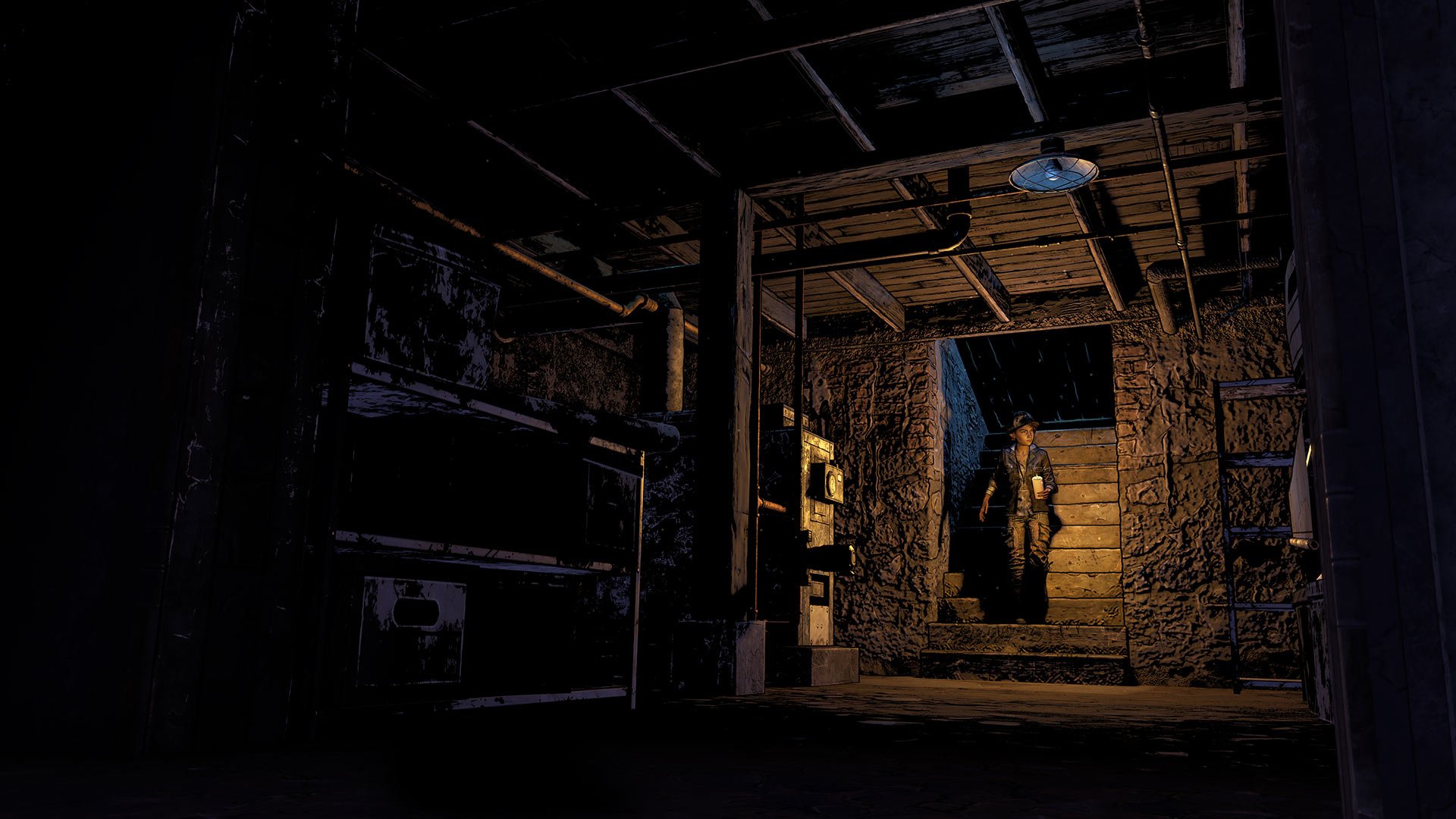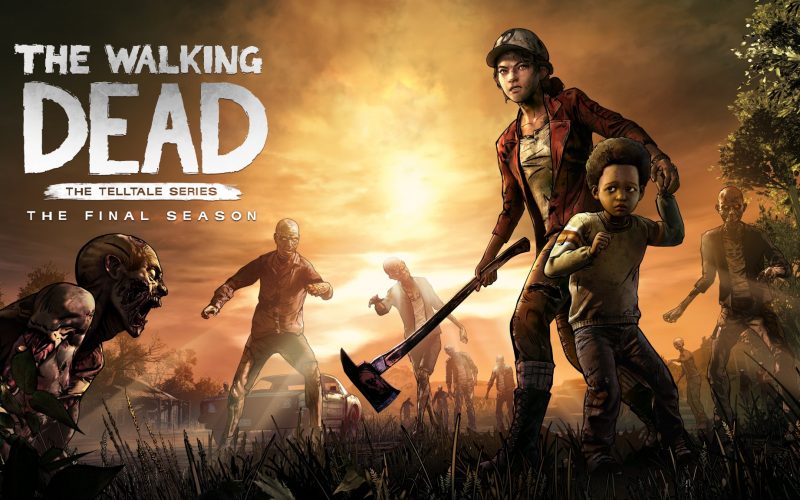Telltale’s The Walking Dead: The Final Season – Episode 1 – “Done Running”.
Recent years have seen Telltale Games become increasingly proficient at cinematic and stylish visual storytelling. This, in the eyes of many, has been at the expense of the stories themselves and it’s hard to argue that its narratives have been as consistently resonant as those of its early years. So too have cracks shown on a technical level with frequent graphical flaws cropping up in many of its recent games.
The Walking Dead: The Final Season comes in the aftermath of both some significant overhauls at the company, as well as in the wake of The Walking Dead: A New Frontier, the poorly received third season. Done Running is the first episode of four for the fourth and supposedly final season and is immediately reminiscent of those earlier games. It’s a somber, introspective affair, with patient pacing and no intent to rush. On a narrative level the similarities to season 1, based on this opening episode alone, seem only to be skin deep despite the impression that the marketing may have given us.
 While there is an obvious connection to be made between Clementine’s role as guardian to Alvin Jr., mirroring Season 1 protagonist Lee’s own role in shepherding a young Clementine through the decaying world, that’s about as far as those likenesses go. While as Lee our role is more or less to simply protect Clementine and impart sparing amounts of wisdom onto her, in The Final Season we take the role of Clem as she tries to steer AJ toward the person she both wants and needs him to be in this world.
While there is an obvious connection to be made between Clementine’s role as guardian to Alvin Jr., mirroring Season 1 protagonist Lee’s own role in shepherding a young Clementine through the decaying world, that’s about as far as those likenesses go. While as Lee our role is more or less to simply protect Clementine and impart sparing amounts of wisdom onto her, in The Final Season we take the role of Clem as she tries to steer AJ toward the person she both wants and needs him to be in this world.
This marks a return for the moral dilemmas that had been missing in more recent games, and in doing so makes for a more emotional experience. A great strength of Telltale’s earlier games lay in those smaller moments being meaningful, making that promise of a tailored experience feel mostly delivered. We open Done Running with the two main characters in a car, searching for food, water, safety. They find a train station, and venture inside to scavenge.
 Very quickly, Telltale’s Walking Dead world feels lived in. It’s the small moments that make this so. We come across a couple, long dead, growling from the chairs they’ve tied themselves to. There’s a story here. A bottle of poison lies on the ground, and an empty crib gathers dust in the next room. The game goes one step further, introducing for the first time collectible items for players to gather. It’s a small thing, but it adds plenty, and is one of a handful of welcome additions to the gaming experience.
Very quickly, Telltale’s Walking Dead world feels lived in. It’s the small moments that make this so. We come across a couple, long dead, growling from the chairs they’ve tied themselves to. There’s a story here. A bottle of poison lies on the ground, and an empty crib gathers dust in the next room. The game goes one step further, introducing for the first time collectible items for players to gather. It’s a small thing, but it adds plenty, and is one of a handful of welcome additions to the gaming experience.
While it hasn’t been overhauled by any stretch, there’s a clear improvement in the graphics and simultaneously an attempt at embracing a visual style more akin to its earlier years. Sharp lines and colours are matched with some striking character design to make for what is arguably Telltale’s best looking game to date. When things go inevitably bad for Clementine and AJ, they’re rescued by a group of kids and teenagers who take them into their refuge, an abandoned school for trouble youths that remains secluded and seemingly undisturbed.
 The scenes in the train station and the subsequent exploration of the school’s halls display a newfound freedom with regards to player control. Though again it isn’t a drastic change to the status quo, the over-the-shoulder perspective and the more free-flow approach to quick-time events (including confrontations that aren’t scripted, as has been the case in all previous games) are welcome additions. Still, this is the same tightly linear experience as all previous games, so detractors won’t be reeled in by the updates.
The scenes in the train station and the subsequent exploration of the school’s halls display a newfound freedom with regards to player control. Though again it isn’t a drastic change to the status quo, the over-the-shoulder perspective and the more free-flow approach to quick-time events (including confrontations that aren’t scripted, as has been the case in all previous games) are welcome additions. Still, this is the same tightly linear experience as all previous games, so detractors won’t be reeled in by the updates.
Marlon, Louis, and Violet are the three key new characters among a number of new faces, each of which offer unique perspectives on their little community and each having learned to deal with the modern world in their own ways. As is the case in every game in this series, this seemingly utopic sanctuary that Clementine stumbles upon harbors some dark secrets, and it build to a climax akin to that of Season 1, Episode 2’s dramatic finale.
 There are twists to be had in the final sequences of the episode, a payoff for the slow-burn introduction to the season that the previous hour and a half has been. Credit must be given to the writing staff, who have made the mundane moments feel relevant. The key to any of these games is to have us invest in the relationships, and I think Done Running succeeds in crafting a plethora of potentially fan-pleasing and compelling dynamics.
There are twists to be had in the final sequences of the episode, a payoff for the slow-burn introduction to the season that the previous hour and a half has been. Credit must be given to the writing staff, who have made the mundane moments feel relevant. The key to any of these games is to have us invest in the relationships, and I think Done Running succeeds in crafting a plethora of potentially fan-pleasing and compelling dynamics.
The episode isn’t lacking in dramatic moments, the highlight perhaps being a particularly well-staged scene in the basement of the school featuring some joyously creepy imagery. Making the zombies a threat is no small feat at this point, as this franchise has made the monsters near-powerless in the ease at which characters are able to dispatch them (looking at the show on this one). And while the monsters do pose a threat – refreshingly so – the focus remains on Clementine and AJ, as it should.
 The game relies entirely on an instantly endearing relationship, but one left on shaky ground with a cliffhanger worthy of its episodic format. The voice work is superb from all actors, and Done Running is a refreshing return to the highs of early seasons. Regardless of whether its strengths will, in hindsight, depend on where the story goes next, this place-setting premiere is a worthwhile promise of compelling things to come with more than enough meat on its own bones.
The game relies entirely on an instantly endearing relationship, but one left on shaky ground with a cliffhanger worthy of its episodic format. The voice work is superb from all actors, and Done Running is a refreshing return to the highs of early seasons. Regardless of whether its strengths will, in hindsight, depend on where the story goes next, this place-setting premiere is a worthwhile promise of compelling things to come with more than enough meat on its own bones.
Film ’89 Verdict – 9/10
The Walking Dead: The Final Season is available on PlayStation 4, Xbox One, PC, and Nintendo Switch. Episode One is out now, Episode Two will be released September 25th, Episode Three on November 6th, and the finale on December 18th.

